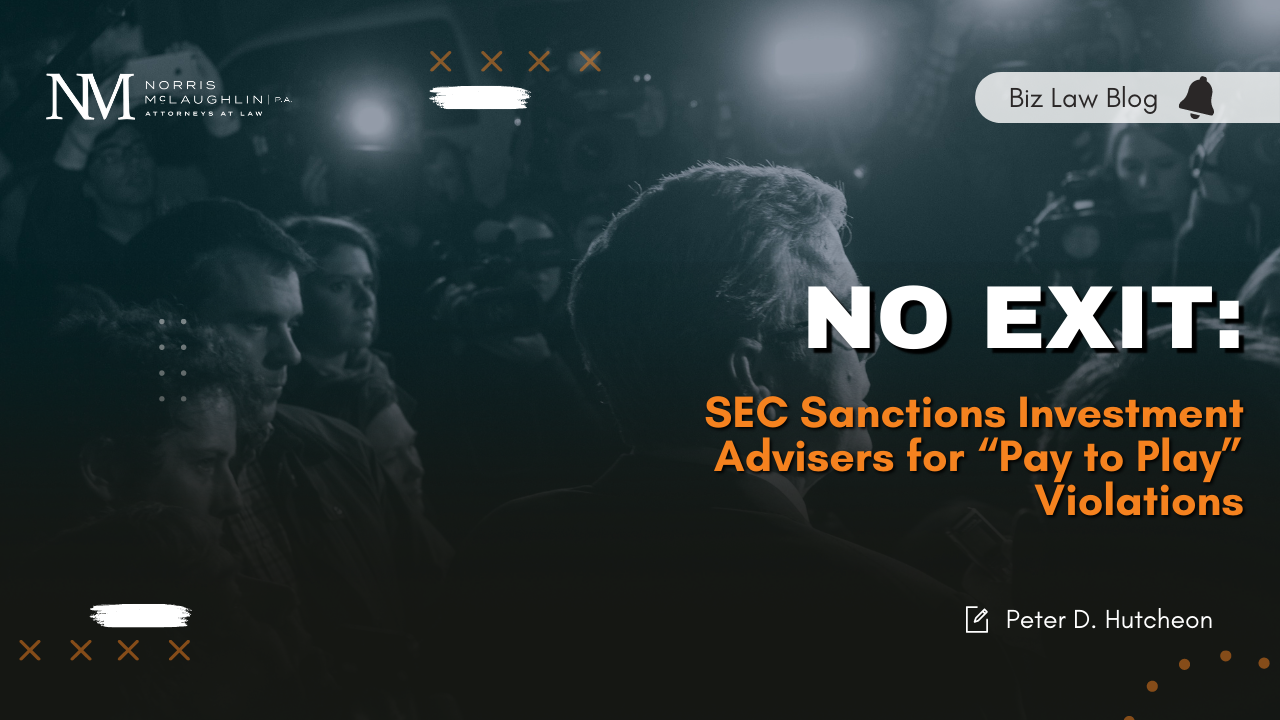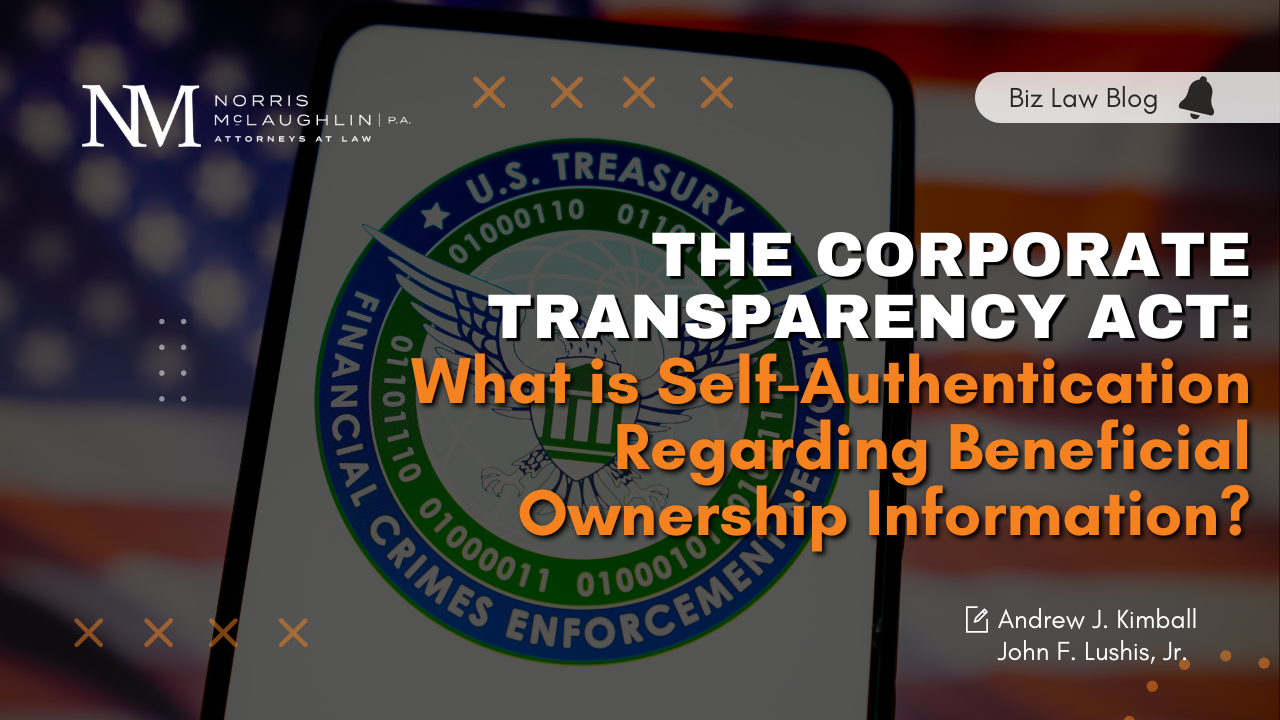No Exit: SEC Sanctions Investment Advisers for “Pay to Play” Violations

Rule 206(4)-5 (the “Rule”) of the U.S. Securities and Exchange Commission (the “SEC” or the “Commission”) promulgated under the Investment Advisers Act of 1940, as amended (the “40 Act”) is, to quote Commissioner Hester M. Peirce from her Statement (the “Statement”) on Sept. 15, 2022, “sweeping in its reach.” The Rule results in disqualifying an investment adviser from providing advice to a government entity for compensation for TWO YEARS after the date on which a “covered associate” (basically: i) employees of the investment adviser with some management responsibility; or ii) any investment adviser employee who solicits a government entity; or iii) any political action committee controlled by the investment adviser) makes a “contribution” (money, services, show or sports tickets, or anything else of value) to that government entity or an official that might be able to engage the investment adviser’s professional services (or be able to influence a decision). “Government entity” is defined in the Rule as “any state or political subdivision”; “a pool of assets sponsored” by a government entity, such as a pension plan; a “plan or program of the government entity” (such as a “qualified tuition plan” or a development fund); or any official or agent acting for the entity. “Official” means any person, including an incumbent or a candidate for office, who is responsible for or “can influence the” hiring of an investment adviser OR who has authority to appoint such a person.
The Rule contains a look-back feature that results in a violation if a person contributes at any time within six months before becoming a “covered associate.” Consider how that affects the hiring process – a new hire who had been at another firm that did not provide advisory services to governmental entities and who makes a “contribution” as part of participating in the political process, will disqualify his or her new employer, which does have governmental entity clients, for TWO YEARS from the date that the new-hire contributed. Even promotions are fraught with peril, as becoming a “covered associate” will disqualify the employer if the employee who was not a “covered associate” at the time contributes within six months prior to the promotion.
There are de minimis exemptions: up to $350 to an official or candidate for whom the “covered associate” is entitled to vote, but only $150 for any other official or entity – this is the $200 “sop” to the right of a “covered associate” to participate in the political process to the extent it affects him or her directly. There is also a “cure”: if the “covered associate” discovers that a “contribution” is violative within four months of making it AND obtains a refund of that contribution (imagine having to determine post hoc the value of contributed services) within 60 days. BUT the “cure” will not work if the amount of the contribution is greater than $350. In addition, if the “covered associate” is one of more than 50 employees of the investment adviser firm, the “cure” is available for only three violative contributions per year. And if there are fewer than 50 employees, only two “cures” per year are permitted. Further, the “cure” will not work in the case of a “covered associate” who makes more than one violative contribution in a year.
So once a “covered associate” makes a contribution, or if the person making a contribution becomes a “covered associate” within six months after making the contribution, the investment adviser is out of the business of rendering advisory services to the governmental entity related to that contribution for TWO YEARS, despite the size of the contribution (if over the de minimis exemptions) or the presence of any intent to affect the decisions of the governmental official. The Rule creates a strict liability regime; there is no need for the Commission to show that some quid pro quo was involved. It all calls to mind two rather similar situations: one, the three people trapped in a doorless room in Huis clos (“No Exit”), the 1944 play by Jean-Paul Sartre; and two, the last verse of The Eagles’ 1977 song “Hotel California,” which goes:
Last thing I remember, I was
Running for the door.
I had to find the passage back
To the place I was before.
“Relax” said the night man
“We are programmed to receive.
You can check out any time you like
But you can never leave.
(Felder, Frey, and Henley, 1976, 00:03:55)
As Commissioner Peirce also observed in the Statement, “the Pay-to-Play Rule is an exceedingly blunt instrument.” Recent SEC enforcement actions provide striking evidence of the “bluntness” of this punitive governmental regulation that imposes such materially adverse consequences on an investment adviser and on a “covered associate.” In effect, the Rule makes any “covered associate” who contributes more than the de minimis amounts into a second-class citizen with a seriously constrained ability to participate in the political process, an ability otherwise guaranteed to all non-convicted U.S. citizens by the First Amendment to the Constitution.
On Aug. 7, 2014, the New York Republican State Committee and the Tennessee Republican Party sued the SEC in the Federal Court for the District of Columbia, asserting that the Rule harmed their ability to fundraise, impaired the ability of their members to make political contributions, and disadvantaged their candidates. The District Court dismissed the case, and the dismissal was upheld first on technical grounds in 2016 and, after reconsidering whether plaintiffs had standing, on the merits in 2018 (a position that remains extant after the U.S. Supreme Court denied certiorari on Jan. 13, 2020). The “winning” argument, as foreshadowed in Bell (2015), “The Constitutionality of the SEC’s Pay to Play Rule: Why 206(4)-5 Survives the Deregulatory Trend in Campaign Finance” from the 49th volume of Columbia Journal of Law and Social Problems is that the Rule is not “a campaign finance restriction,” but rather is a “special case of the Commission’s … anti-fraud interest.” Bell notes that the “SEC’s stated purpose in adopting …[the Rule] was not phrased as an anti-corruption interest,” but rather as required “to prevent fraudulent and manipulative conduct.”
The SEC has brought any number of enforcement cases under the Rule since its adoption in 2010. The origins of the Rule were the enactment in 1994 of a comparable regulation by the Municipal Securities Rulemaking Board (“MSRB”). The MSRB was created by Congress in 1975 as a self-regulatory body subject to the oversight of the SEC, with the mission to create rules to regulate the market for municipal securities and to prevent “fraudulent and manipulative acts.” It is probably best known for adopting Rule G-37 in 1994 in response to the continuing growth of negotiated municipal securities placements, as opposed to the public “auction” system that had generally applied until the early 1990’s. Evidencing the impact on legislation by market participants using the negotiated approach to the placement of municipal securities, many of those participants sought to avail themselves of the legal process. In the “fall out” from the Great Recession 2007-2009, Congress enacted the Dodd-Frank Wall Street Reform and Consumer Protection Act of 2010, which in turn led the SEC to adopt the Rule, so that the pay-to-play restrictions were no longer limited to the arena of municipal securities.
So, as this blog was originally written only a week before the 2022 Midterm elections, let us review how the Commission in those recent enforcement actions applied the “blunt instrument” of the Rule. Four investment advisers (in the words of one commenting law firm) “found out the hard way how easy it is to violate the Rule when they settled administrative proceedings [brought by the SEC] on a neither-admit-nor-deny basis.” Those proceedings were as follows:
- The Asset Management Group of Bank of Hawaii – An officer of the Bank indirectly supervised from September 2018 to October 2019 employees who solicited engagements to provide investment advice. The officer made a $1,000 campaign contribution to the Governor of Hawaii on July 26, 2018. The Governor appointed all 11 members of the Board of Regents of the University of Hawaii, all of whom influence the selection of investment advisers by the University. The Bank was ordered to cease-and-desist from future violations, was censured, and agreed to pay a civil penalty of $45,000.
- Canaan Management, LLC – A “covered associate” made a $1,000 contribution to the campaign of a candidate for the Governor of California. Discovering his error, the associate attempted to obtain a refund of the $1,000, but the contribution exceeded the $350 limit, and the refund was not completed within 60 days. The Governor can influence the selection of investment advisers by the Board of Regents of the University of California, since the Governor serves on that Board and appoints 18 other Board members, and those selected investment advisers would oversee the investment of the University’s endowment funds. Canaan was ordered to cease-and-desist from future violations, censured, and agreed to pay a civil penalty of $95,000.
- StarVest Management, Inc. – Two “covered associates” made contributions (one $1,000 and the other $400) to the same unsuccessful candidate for Mayor of New York City. The Mayor has influence over the selection of both investment advisers and pooled investment vehicles for the City’s pension systems, as the Mayor appoints at least one member of the Board of every pension system. No effort to “cure” the violations would succeed even if a refund of the contribution were sought in time, because the size of the contributions made the “cure” unavailable. StarVest was ordered to cease-and-desist from future violations, censured, and agreed to pay a $70,000 civil penalty.
- Highland Capital Partners LLC – A “covered associate” made a $1,000 contribution to the campaign of an unsuccessful candidate for Governor of Massachusetts. The Governor sits as a member of the Massachusetts Pension Reserves Investment Management Board and appoints two other members and, hence, can influence who the Board selects to provide investment advice to the funds overseen by the Board as well as the pooled investment vehicles that the Board might use to invest those funds. Due to the contribution amount, the “cure” was not available. Highland Capital was ordered to cease-and-desist censured and agreed to pay a $95,000 civil penalty.
In addition to the specific sanctions, each of those advisers were precluded from rendering investment advisory services to the government entities involved FOR TWO YEARS, a substantial punishment that on its face seems all out of proportion to the magnitude of the violations. Those investment advisers are also required to disclose in their respective forms ADV the nature of the violations involved and the consequences of the enforcement actions – not beneficial for the reputation or business development of those investment advisers. Note that none of the four enforcement cases involved any allegations of intentionally seeking political or business advantage, i.e., no quid pro quo. Indeed, the political campaigns for Governor (Hawaii, California, and Massachusetts), or for Mayor of a major city like New York, requires the expenditure of millions of dollars to be competitive. In that context, how much “influence” would a contribution of $1,000 purchase?
It is precisely these disparities between actions and consequences that caused two (Mark Uyeda and Hester Peirce) of the five SEC Commissioners to dissent from the issuances of these enforcement orders. In three of the cases, the advisers were involved with investments in closed-end funds, hardly the type of “pooled investment vehicles” likely to attract a greedy politician. In the fourth case, the contribution was made by an employee who was not a “covered associate” at that time; the Rule was triggered only because he received a promotion within the six-month look-back period following the contribution. Moreover, as Commissioner Peirce noted in the Statement, none of the investment advisers solicited new or expanded business from the relevant government entity after making the violative contribution.
Another matter deserving attention is the way violations of the Rule were, and going forward- are, discovered; not one in the case of the four advisers discussed here was found to be into alleged corruption. In that regard, it is also noteworthy that three of the four advisers were not registered with the SEC because they served only a limited number of institutional clients. Accordingly, it is unlikely that the violations were identified during an SEC examination of those advisers. Rather (as a number of law firms have suggested) the violative contributions were probably discovered by comparing “public information regarding persons [who as “covered associates” of investment advisers] filing for exemptions as a venture capital fund adviser versus public databases of [campaign] contributions.” It is not very far from embodying the “Big Brother” who is “Watching You” in George Orwell’s novel 1984 to operate as an investment adviser under the Rule. It is worth reemphasizing here that making contributions to political campaigns is not just an accepted part of the American political process, it is a constitutionally protected right – except under the Rule for “covered associates” and investment advisers. As asserted by Commissioner Peirce in the Statement the Rule “imposes unique, unquantifiable costs on individuals by impeding their ability to participate in the political process.” She goes on to observe, with respect to any request for an exemption from the Rule, that the request becomes a publicly available document, and the request must include a “description of the “covered associate’s intent or motive in making [the] contribution.” She then adds:
A government agency’s probe into the motives of a person exercising her right to participate in the political process is not comfortable for anyone involved and can itself become political.
…The Rule, agnostic to evidence of actual, harmful pay-to-play schemes, dissuades political contributions that have nothing to do with obtaining advisory business from government clients…it is past time to consider how [the Rule] might be improved.
Having already referenced Orwell’s 1984, I hope one might forgive my invocation of the thrust of Vladimir Lenin’s 1902 pamphlet, “What Is to Be Done?” Here are a few suggestions in response to Commissioner Peirce’s request that improvements be considered:
- Delete the look back period: that provision implies that persons are clandestinely taking steps to buy favor, before becoming (but notionally, knowing that the status change was coming) a “covered associate”; but in actual operation serves as a trap for the unwary, as it did the official of the Bank of Hawaii.
- Materially increase the number of contributions that are regarded as de minimis: up to $3,000 for a contribution to someone for whom the “covered associate” may not vote; and up to $5,000 to someone for whom the “covered associate” may vote; AND index those amounts for inflation by annual adjustments.
- Require the Commission to show by a preponderance of the evidence that the contribution is causally connected to the solicitation of advisory business from a government entity.
These changes should preserve the SEC’s ability to discipline investment advisers who do seek to “buy” government engagements, while at the same time reducing the material interference of the ability of investment advisers and their “covered associates” to participate in the American system of representative government, and thereby “open the Exit Door” from the locked system of the Rule in its present form.
If you have any questions concerning this post or any related matter, please feel free to contact me at pdhutcheon@norris-law.com.




